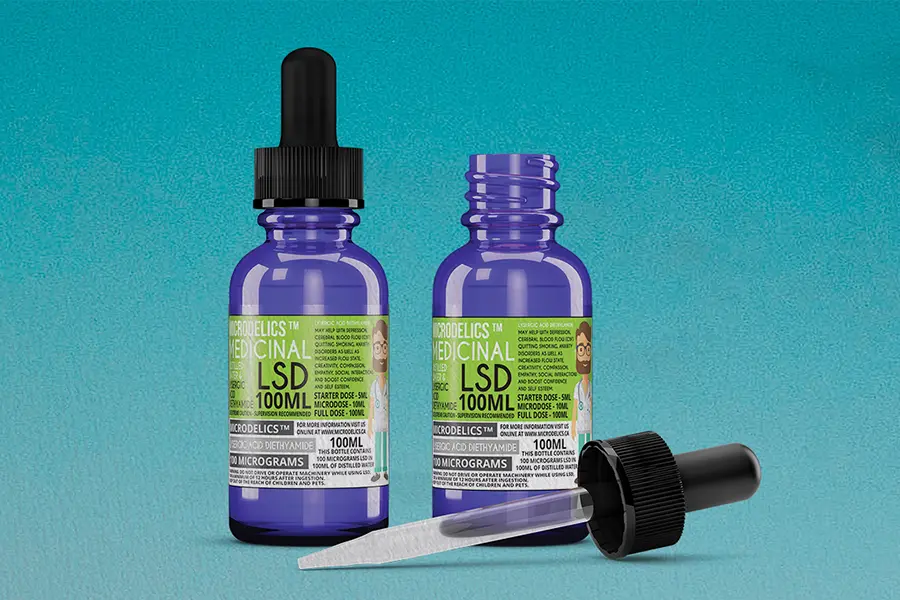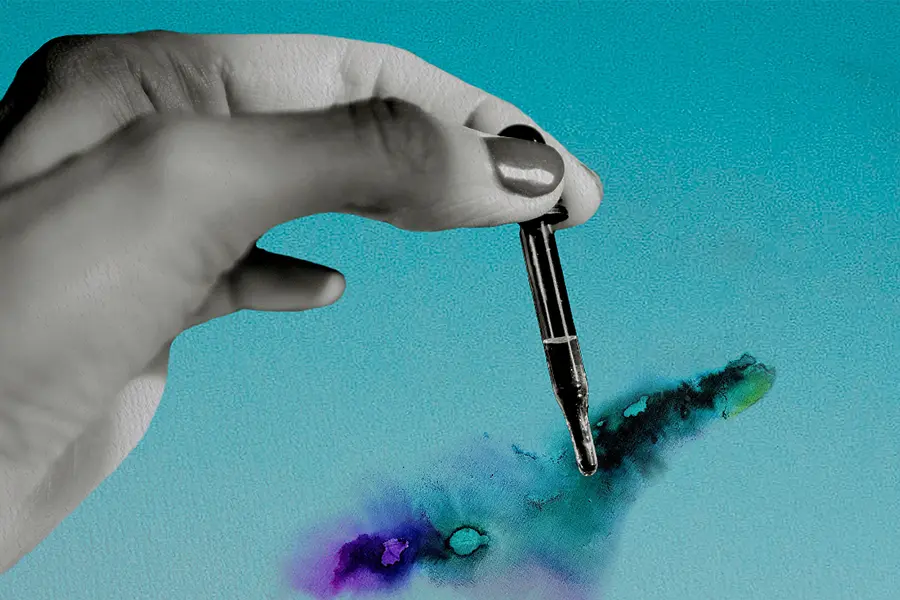Microdosing: a growing trend embraced by Silicon Valley biohackers, experienced psychonauts, and those looking for a subtle, psychedelic reframe in consciousness. Felt as a little boost, or a way to get your toes wet if you’re curious about psychedelics, the practice of microdosing is thought to provide many of the benefits of say LSD or psilocybin without the intensity of a full psychoactive experience.
By and large, however, microdosing has required a robust DIY approach in order to source the material, dilute it properly, and estimate a dose small enough not to make you trip. In the case of LSD—which comes in tab, liquid, or other forms—figuring out a microdose can be a bit trickier than simply weighing out dried mushrooms.
To take care of that footwork, however, a Canadian company called Microdelics has come out with a microdosing kit. The ready-made kit comes in a little blue bottle containing 100 micrograms (mcgs) of 1P-LSD, a derivative and functional analogue of LSD, along with instructions to measure specific doses. Generally speaking, microdose recommendations range from 7-20 mcgs.
1-propionyl lysergic acid diethylamide, or 1P-LSD, is structurally similar, but not identical, to the original molecule. While the exact mechanisms of its action are not yet understood, it’s possible that 1P-LSD is a “prodrug” of LSD—meaning that it could convert to LSD in the body. In mice, 1P-LSD is shown to contain only 38 percent of the strength of LSD, though that difference doesn’t necessarily translate directly to humans. Many people, in fact, report that the two molecules are nearly identical in effect.
Because of its subtle molecular differences, 1P-LSD bypasses prohibition in places like Canada, occupying a kind of legal grey area where regular LSD may otherwise be illegal. 1P-LSD can be found online and is often marketed as a research chemical not meant for human consumption, though thousands of people do consume it. Following the protocol put forth by psychologist and microdosing expert James Fadiman—to microdose every four days—users of 1P-LSD report an increased sense of wellbeing and connectedness along, with greater focus and a subtle energy boost.
Jerry Martin, CEO of Microdelics, founded the company in 2019 to increase access to psychedelics—which he credits with helping him overcome depression. A former cannabis dispensary owner who earned the moniker King of Compassion in the Saskatchewan town where he ran his shop for four years, Martin has been part of the plant medicine movement for almost a decade and also owns a company guiding ayahuasca tours in Peru.
How to Grow Shrooms Bundle
Take Both of Our Courses and Save $90!
According to Martin, while consuming larger doses of psychedelics (i.e. macrodosing) can be particularly helpful for people with mental health issues who are adequately prepared and/or under the care of an experienced guide, microdosing offers its own rewards. Martin credits microdosing with improving his quality of life, including his attitude and workflow. “It’s done wonders for me,” he tells DoubleBlind.
Currently, psychologist Richard Knowles of Delos Psyche Research Group is working with Martin and Microdelics to secure approval and funding for the first double-blind, dose response study on the psychological effects of microdosing. If the study is approved, researchers will use, “eleven different psychometric assessments to track changes in depression, anxiety, stress, mindfulness, quality of life, social activity, engagement, absorption, occupational burnout, emotional dysregulation, and more,” Knowles tells DoubleBlind. He and Martin hope to initiate the study within the next few months.
Microdelics ships product within Canada and to countries without the kind of analog or prodrug laws that explicitly make 1P-LSD illegal—which for now excludes the United States, the United Kingdom, continental Europe, and Japan. But Martin has hopes that, as the psychedelics movement evolves and decriminalization efforts progress, access to this potentially transformative molecule will improve. “It’s not really meant to get you high,” he says. “It’s meant to enhance the normal functionality of your life.”

Interested in having a psychedelic experience, but don't know where to start? Get our definitive guide on trusted legal retreat centers, clinical trials, therapists, and more.



